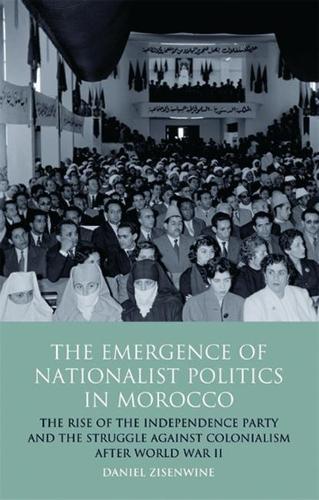
The Emergence of Nationalist Politics in Morocco: The Rise of the Independence Party and the Struggle Against Colonialism After World War II
(Hardback)
Publishing Details
The Emergence of Nationalist Politics in Morocco: The Rise of the Independence Party and the Struggle Against Colonialism After World War II
By (Author) Daniel Zisenwine
Bloomsbury Publishing PLC
I.B. Tauris
30th September 2010
United Kingdom
Classifications
Tertiary Education
Non Fiction
Nationalism and nationalist ideologies and movements
National liberation and independence
324.264083
Physical Properties
Hardback
272
Width 138mm, Height 216mm
Description
The end of World War II intensified Morocco's nationalist struggle against French colonial rule, with the establishment of the Istiqlal ('independence') party and the Moroccan Sultan's emergence as a national leader. In this book, Daniel Zisenwine charts the rise of Morocco's leading nationalist party, and illustrates the weakness of Moroccan political parties at the outset of the anti-colonial struggle. While Morocco today faces formidable challenges, its political system remains profoundly influenced by the events charted in this book. Drawing from a wide range of previously unpublished sources, Daniel Zisenwine presents the background to the Istiqlal's establishment, its initial actions and demands, and an extensive discussion of its social activities aimed at mobilizing the Moroccan public during the anti-colonial struggle.
Reviews
'This is a solidly-researched study of an important dimension of Moroccan political history that deserves renewed attention given the emergence of a more liberalized and pluralistic political order under King Mohammed VI. The book's focus on the French protectorate and the forces that eventually led to the creation of the country's first modern political party, the Istiqlal party, around which the nation's independence movement was organized, is both timely and informative. The Istiqlal has demonstrated a remarkable resiliency over these last six decades as it has reemerged as a leading political force in legislative life. While questions remain on the long-term importance of Moroccan political parties in their contest for democratic supremacy in a system still overwhelmingly dominated by monarchical authority, a re-evaluation of the Istiqlal's role in raising Morocco's nationalist consciousness and, indirectly, giving legitimacy to the country's status as a constitutional monarchy, deserves the attention of all those interested in Moroccan political history and, more broadly, the nature of party formation and participation in non-democratic systems. The use of numerous archival sources and primary documentary materials including original correspondence adds to this study's value to both scholars and students alike.' - John Entelis, Professor of Political Science and Director of the Middle East Studies Program, Department of Political Science, Fordham University, New York, and Editor-in-Chief of the Journal of North African Studies; 'With this book, Daniel Zisenwine has offered a thoughtful, engaged analysis of the nationalist movement. It is a careful treatment, enriched by a close analysis of archival material, including official communiques, as well as journalistic accounts. Most importantly, this book does a superb job of making clear the ways in which decades old history remains salient to this day. It will be a valuable contribution to the literature.' - Gregory White, Professor of Government, Smith College, and Associate Editor of the Journal of North African Studies
Author Bio
Daniel Zisenwine is Research Fellow at The Moshe Dayan Center for Middle Eastern and African Studies, Tel Aviv University.
